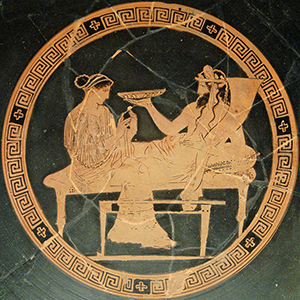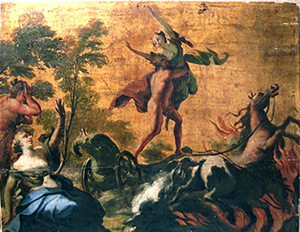 When I embarked upon writing the tales that would comprise my Hades Cycle, I did quite a bit of re-reading of Greek mythology. Since I’ve always been fascinated by the stories of the ancient world, this was a pleasure and a treat.
When I embarked upon writing the tales that would comprise my Hades Cycle, I did quite a bit of re-reading of Greek mythology. Since I’ve always been fascinated by the stories of the ancient world, this was a pleasure and a treat.
Naturally, with the underworld serving as the lynchpin of the series, I needed to review the deeds of its ruler Dìs (also known by many other names and epithets). I’d not realized in my first reading encounters with him that his abduction of Persephone was not a one-off. The fellow had practice!
Theophile, a mortal girl who boasted that she was more beautiful than Persephone when the maiden goddess remained yet under Demeter’s aegis, caught Dìs’ attention with her claims. There must have been some substance to the girl’s words, because Dìs was captivated.
He stole Theophile away to Hades, where she lived out her mortal span of years as Dìs’ companion and lover. When she died, Dìs turned her into a white poplar tree growing in the Elysian Fields, a paradise where virtuous mortals dwell after death.
The white poplar has special significance, because of the stature it holds as the victory wreath donned by the hero Heracles in celebration of his return from the underworld after completing his twelfth labor there. The distinctive leaf of the white poplar—dark on its upper surface and pale on the underside—symbolizes the duality of the full tally of Heracles’ labors, most in the daylit world under the sun, but the final one in the dark of the underworld. A hero must prevail not only in waking deeds, but also in the murkiest depths of his own psyche.
The white poplar possesses an alternate symbolism (acquired from Dìs’ hands before the advent of either Heracles or Theophile), but I’ll discuss that anon. For now, let’s return to Dìs’ love life. 😉
Minthe, a later mistress of Dìs, was a river nymph. No mention is made of how she came to dwell in Hades at the god’s side, but she came to no good end. Dìs was said to have put her aside when he married Persephone, and the nymph refused to go quietly. Like Theophile, she boasted that she was more beautiful than Persephone, and she claimed that Dìs would soon take her back and place her on Persephone’s throne as his queen.
Demeter, jealous of her daughter’s rights, turned Minthe into garden mint! (In another version of the myth, Persephone becomes enraged and tramples the nymph, turning her into mint in the process or else simply killing her, with the result that Dìs turns Minthe into mint to preserve her.)
 Leuce, perhaps the first mistress taken by Dìs, was an ocean nymph and reputed to be the most beautiful of all the nature spirits gracing the ancient world. Like Theophile and later Persephone, she too was abducted by the god. Despite that inauspicious beginning, Dìs loved her with a love that would not be rivaled until he married Persephone. When Leuce eventually died, Dìs was inconsolable.
Leuce, perhaps the first mistress taken by Dìs, was an ocean nymph and reputed to be the most beautiful of all the nature spirits gracing the ancient world. Like Theophile and later Persephone, she too was abducted by the god. Despite that inauspicious beginning, Dìs loved her with a love that would not be rivaled until he married Persephone. When Leuce eventually died, Dìs was inconsolable.
After an interval during which he could only mourn and weep, he decided to create a memorial of his love for Leuce and of her love for him. In the Elysian Fields, he brought into being the first and archetypal white poplar tree. As a memorial, it stood for memory, memory of a love that would never fade, never grow old, a love so strong that it could be regenerative.
The white poplar was sacred to Persephone, and the name Leuce became one of Persephone’s epithets, almost implying that the nymph was resurrected in the goddess. In the first tale of The Hades Cycle, “Eurydice Otherwise,” my heroine makes essential use of the white poplar in her efforts to save herself. And I, as the author, make use of Dìs’ reputation to posit that the three abductions on his record might not have been the only abductions he attempted.
For more about the gods and goddesses of the ancient world, see:
Lugh and the Lunasad
The Norns of Fate’s Door
Mother Holle

